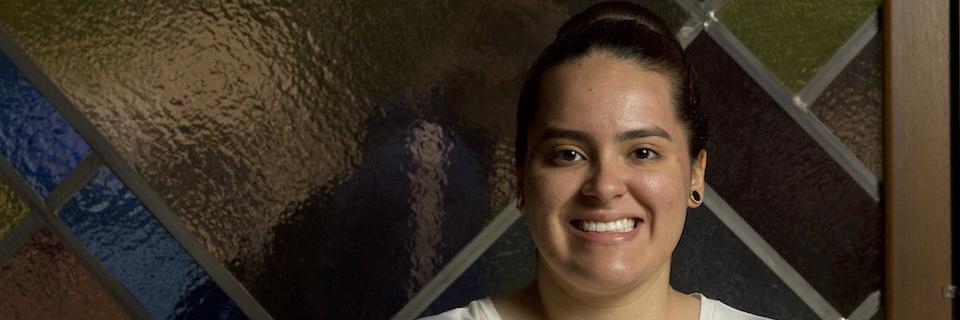Student Finds Opportunity in DACA, Sees Hope in Future Legislation

Mariana Valles doesn’t remember much about the time before she lived in Belton, Missouri.
That makes sense — she was 4 years old when her mother and father brought her sister and herself from Chihuahua, Mexico. She said she remembers asking over and over how much longer the 18-hour bus ride would last. At the time, she said she couldn’t point to Kansas City on the map, couldn’t speak English, and couldn’t know why her parents were moving the family so far away.
Now, the junior business analytics and technology major at Rockhurst understands why.
“We moved because my parents were wanting a better education for me and my sister,” she said. “They were wanting a better life. They wanted us to have an opportunity to get a college degree.”
Upon settling in Belton, near family, Valles said she learned English — watching Dora the Explorer helped — and adjusted to the U.S. Her life, as far as she knew, was here.
Valles said she transferred to Rockhurst from Donnelly College, her degree here made possible after receiving the Phi Theta Kappa scholarship from the honor society for two-year students. She said that scholarship, which covers her tuition costs, and the opportunity to enroll at Rockhurst, were crucial in helping her achieve her goals. Despite living almost all of her life in the United States, Valles said, she finds many doors closed because of her status.
Valles is one of more than a half million people covered by the Deferred Action for Childhood Arrivals, a 2012 federal policy designed to shield those who arrived in the United States as children from deportation. Along with the Deferred Enforced Deportation and Temporary Protected Status, DACA is one of three immigration and refugee-related programs under different degrees of legal or administrative threat, making Valles’ continued status as a resident of the United States one that often feels precarious.
“I honestly try not to think about it as much, because I know at the end of the day, everything will work out, one way or another,” she said. “But whenever I do start thinking about applying for jobs or applying for internships, I think about the fact that if DACA is ever terminated, I won’t be able to work legally in the United States. I won’t be able to drive. If I want to pursue a master’s degree, I won’t be able to find scholarships, or I might not be able to pay for my school.”
Currently sitting in the U.S. House of Representatives is House Resolution 6, the American Dream and Promise Act of 2019, which would grant permanent legal status to recipients of DACA, DED, and TPS. Valles said having faced so much uncertainty throughout her experience as a U.S. resident, passage of the act would be life-changing.
“I think I would be equally as excited as when I found out about my (Phi Theta Kappa) scholarship. I would obviously be able to live a more worry-free life,” Valles said. “I wouldn’t have to worry about what, if DACA gets terminated the next day, what it would be like, I wouldn’t have to think about going to another country and moving my whole life around.”
The Association of Jesuit Colleges and Universities is currently sharing stories about the Jesuit dreamers like Valles at its 28 member institutions throughout the country, and encouraging members of Jesuit campus communities to take action in favor of House Resolution 6. By sharing her own story — both the challenges she’s faced and the example she hopes to set — Valles said she hopes to inspire others and, hopefully, help others with experiences like her own.
“I want to influence my peers, other people who are behind me in my same situation, so they can know that it is possible to get a degree, it is possible to achieve your dreams, despite all of the negativity that we are surrounded with,” she said.







